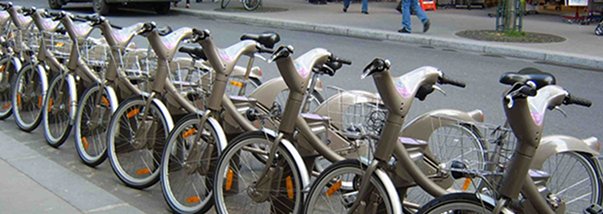How a Bike Share Social Enterprise Can Change Australian Transportation
Bike Sharing has become one of the primary forms of inner city transportation in many cities around the world. It allows local residents, business commuters and tourists to make short trips around a city by bike rather than using buses, trains, taxies or their normal car. The advantages of such a system are instantly recognisable from the reduced emissions that are generated through not using automotive transportation to the health benefits from cycling rather than driving.
The technology of bike share systems is at a point where it can be purchased off the shelf and deployed in a matter of weeks with minimal to no city works required. It employs some of the latest communication technology to complete a cohesive network of communication from rack to rack even allowing users to check on their iPhone to find the closest available bike. Each bike rack is powered by a solar panel in order to make it completely self reliant.
So with the technology removed as a barrier why don’t we have a bike share system in every CBD and Community Australia wide? Looking at existing models provides some answers. The primary model is for the City to give up public space to an advertising company who in exchange will deploy and maintain the bike share system. The main issue with this is that once the advertising company has their ad space the bike system becomes an expense which can lead to cost cutting and poor maintenance of bikes (as has been seen in many European cities).
The second most popular model is for the city to foot the bill and pay a third party to run the system. The problem with this is that public funds are being used on something that is a good cause but could be used on any of the other pressing social needs. The City of Brisbane has just commissioned JCDecaux to install a system in and around the Brisbane CBD (primary model) and the City of Melbourne in co-operation with RACV starts installing their system this month (secondary model).
I believe there is a third model that takes pressure of public funds and reinvests all revenue back into the community. This is the Social Business / Social
Enterprise model which we are working to develop for Cyclefreo, a bike sharing system in the popular tourist destination and green city of Fremantle, Western Australia.
Cyclefreo will be a for profit, zero dividends company with all revenue reinvested into the bike share system to make it better and the remainder going towards achieving specific social objectives such developing underprivileged youths skills. So how will it make money and why is it different? Revenue will be generated through subscriptions (like the other system) and pay per use along side advertising and sponsorship of bike racks. There is the opportunity to sell the carbon credits generated by every ride as an additional revenue stream. Cyclefreo will partner with local businesses and community groups to offer youth training programs (fixing bikes etc) along with leadership and skill development courses all related to running the Cyclefreo business. Having the community so heavily involved will encourage both use and care for the bikes.
Once self sustaining; investors will have the opportunity to withdraw their initial investment (and only their initial investment – no dividend remember) or keep it invested and working towards achieving the social objectives of Cyclefreo. Once established in Fremantle there will be the opportunity to roll out similar systems in regional centres, University campuses and dense inner city communities which will reduce traffic and encourage a more healthy lifestyle all while contributing back to the community.
We are currently assembling a project team between the City of Fremantle, Public Transport Authority and local social groups to complete a full feasibility study. You can follow the progress at http://www.cyclefreo.com and feel free to get involved as everything will be posted on the website for public discussion.
loading...
loading...
Tags: cycling




Voices of our community